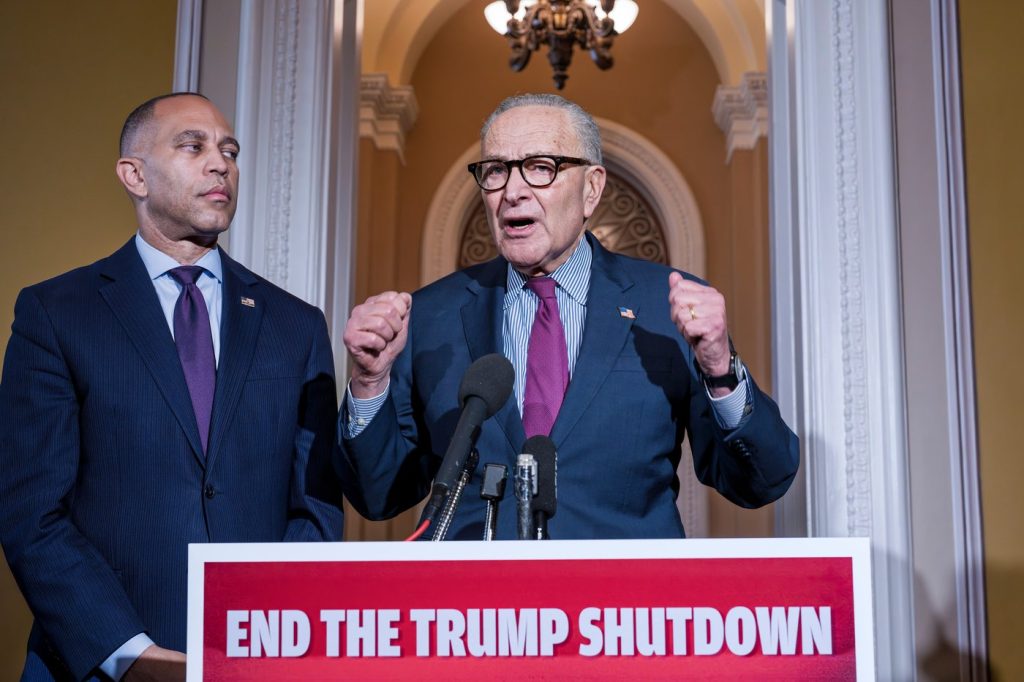As the government shutdown enters its third week, President Donald Trump has shown minimal urgency to negotiate a resolution, opting instead to remain on the sidelines. Democrats assert that any compromise is unlikely without Trump's direct involvement. The situation in Congress has reached a standstill, with the House out of session for nearly a month, while frustration is mounting among senators over the lack of progress.
Republican leaders refuse to engage in negotiations until a short-term funding bill is passed to reopen the government. Democrats, on the other hand, demand guarantees regarding health insurance subsidies before agreeing to any such measures. Trump's administration has been actively managing the shutdown through unconventional approaches, including continuing to pay military personnel while laying off other federal employees.
When reporters questioned Trump about using his dealmaking skills to resolve the shutdown, he appeared disinterested, stating, "all we want to do is just extend." He dismissed Democratic demands regarding healthcare as "crazy" and emphasized that his administration's priority is merely to extend existing agreements without adjustments. His spokesperson, Karoline Leavitt, reiterated the stance that Democrats must first vote to reopen the government before serious negotiations can commence.
Amidst these tensions, some Republican lawmakers are beginning to express frustration, acknowledging that progress is unlikely without Trump's guidance. Senator Lisa Murkowski remarked on the stagnation in Congress, emphasizing the President's pivotal role in advancing discussions.
Despite the government shutdown, Trump's administration has swiftly implemented its vision for the federal government. Budget chief Russ Vought, referred to by Trump as the "grim reaper," has seized this opportunity to withhold billions of dollars from infrastructure projects and lay off thousands of federal workers, suggesting that workforce reductions may become increasingly severe. Furthermore, these unilateral actions have come under legal scrutiny, with a federal judge recently ruling against the administration's layoffs, citing politically motivated actions lacking adequate justification.
Congress's inaction has left little room for other legislative matters, with House Speaker Mike Johnson declaring that the House shall not return until a funding bill is approved. In a dramatic twist, he has also refused to swear in Rep.-elect Adelita Grijalva, citing concerns that her presence could enable a vote related to the ongoing Jeffrey Epstein investigation.
Polling data shows that public sentiment toward both parties remains relatively unchanged. According to an AP-NORC poll, only 30% of U.S. adults view the Democratic Party favorably, while the Republican Party holds a favorability rating of 40%. This situation has led to a stalemate, with each party convinced they are winning the messaging battle despite the ongoing crisis.
Despite Democratic leaders expressing their frustrations regarding Republican inaction, they are increasingly turning to Trump, recognizing that reaching a resolution may hinge on his participation. Senate Minority Leader Chuck Schumer and House Democratic Leader Hakeem Jeffries pointed out the lack of serious proposals from Republicans to end the standoff.
Trump's influence over the legislative process has become increasingly evident, as both parties realize that significant moves often depend on his approval. Democrats are now seeking firm assurances to prevent any rollback of agreements, drawing on experiences where the White House has previously unilaterally altered legislative decisions.
Overall, the current deadlock illustrates the complexities of the interplay between the executive and legislative branches under Trump's leadership, highlighting the challenges faced by both parties in navigating their respective stances amid a government shutdown.










